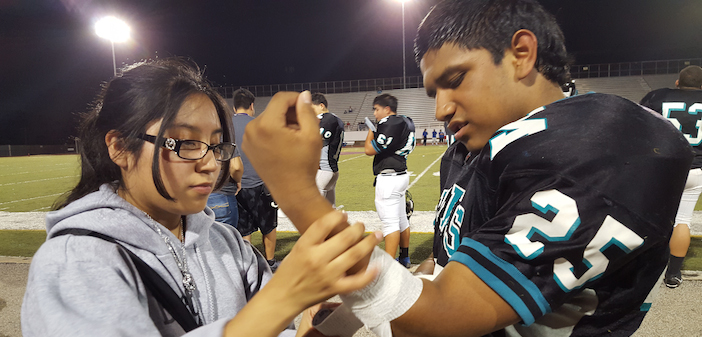Samantha Zuniga always knew she wanted to help people in some way, she just wasn’t sure how.
As a sophomore in the School of Health Professions at the Yvonne A. Ewell Townview Center, Zuniga found the answer when she learned about the school’s Therapy Careers Cluster, which focuses on various types of therapeutic careers, including Athletic Training.
“When we went over what athletic trainers do and how they help athletes, I fell in love,” said Zuniga, now a senior in the program. “I love the idea of being able to be part of an athlete’s career. If they get hurt, I get to be there at that moment and help them get them back to where they were.”
Yvonne Morgan, the program’s instructor and founder, says that opportunity to be “first responders” is what is unique about her program. What began as a classroom curriculum in which Morgan could only simulate athletic injury scenarios for her students has morphed into an internship where students can gain resume-worthy experience.
In 2012, Morgan invited Phil Francis, the head of Dallas Independent School District’s Sports Medicine and Athletic Training Department, to come and visit her classroom. She was seeking opportunities to expand her program beyond classroom instruction.
A proposal to create a student-athletic training program followed Francis’ visit, and the first internship program was initiated in October 2012. The program allowed students to shadow the district’s Licensed Athletic Trainers, or LATs, at district field-houses. Francis said the students worked games alongside LATs and assisted with the evaluation and rehabilitation of injured athletes.
Morgan said while students had learned anatomy, evaluation and treatment techniques, the internship allowed them to “be hands-on” and put into practice what they were learning in her classroom.
The following year, with LATs placed at each of the district’s 22 comprehensive high schools, students were able to serve their home school campus athletic programs. The student trainers were able to build relationships with the athletes and coaches and get the “first responder” experience that many like Zuniga desired.
Francis said students participated in athletic injury evaluations, overseeing progressive stages of rehabilitation, concussion management and injury care protocols, procedures and record keeping.
“Being able to learn what athletic trainers do for a living and to actually practice that knowledge with a professional athletic trainer and their athletes is an amazing experience,” Zuniga said. “Not only does it give me a chance to see if this is really what I want to pursue as a professional career, it allows me to experience helping athletes firsthand.”
Through her experiences, Zuniga has gotten a First Aid certification and undergone training in identifying concussions in athletes.
“We are always learning something new,” Zuniga said of her internship. “You never truly know what to expect and how you’re going to use that new knowledge to help athletes.”
Of the previous year’s student trainers in Francis and Morgan’s program, 10 have gone on to pursue positions in college athletic training programs. Someday, in the near future, Zuniga hopes to be among them. The Health Professions senior plans to study athletic training at the University of Texas at Arlington while working towards her teaching certification.
“I am hoping to become an amazing athletic trainer,” Zuniga said. “I might even work with a professional NFL team like the Dallas Cowboys.”

